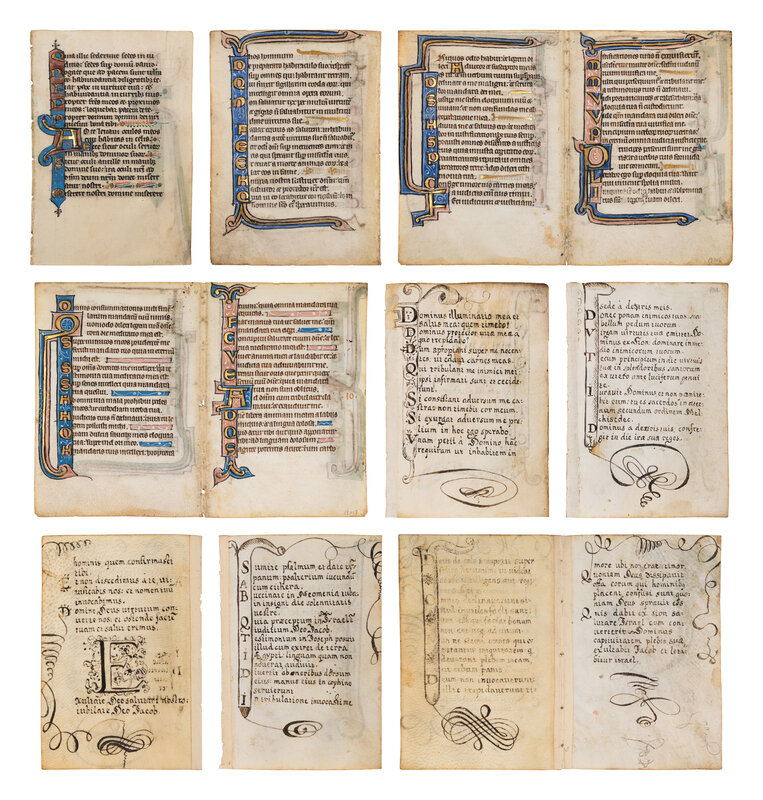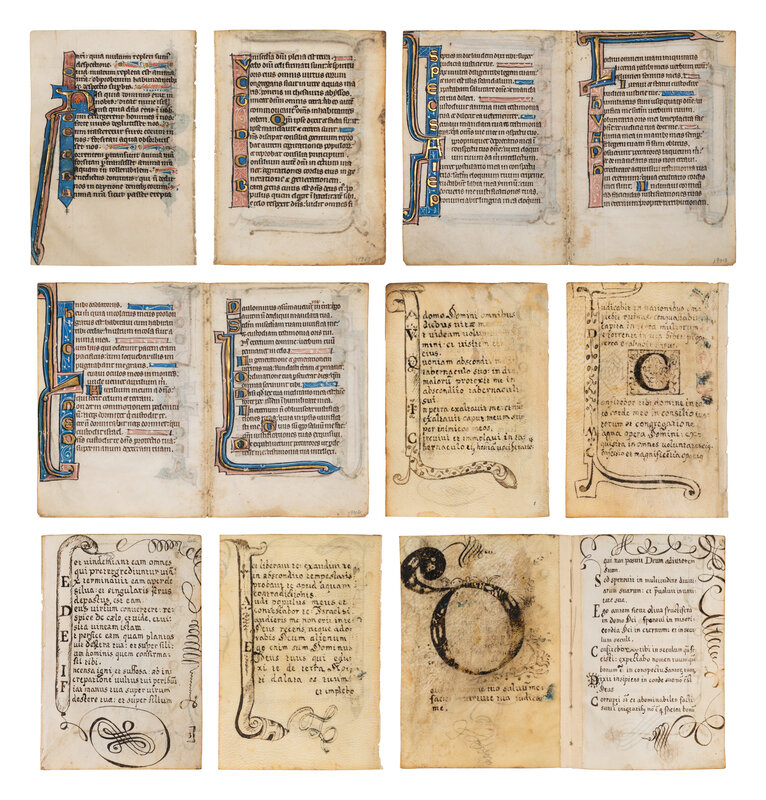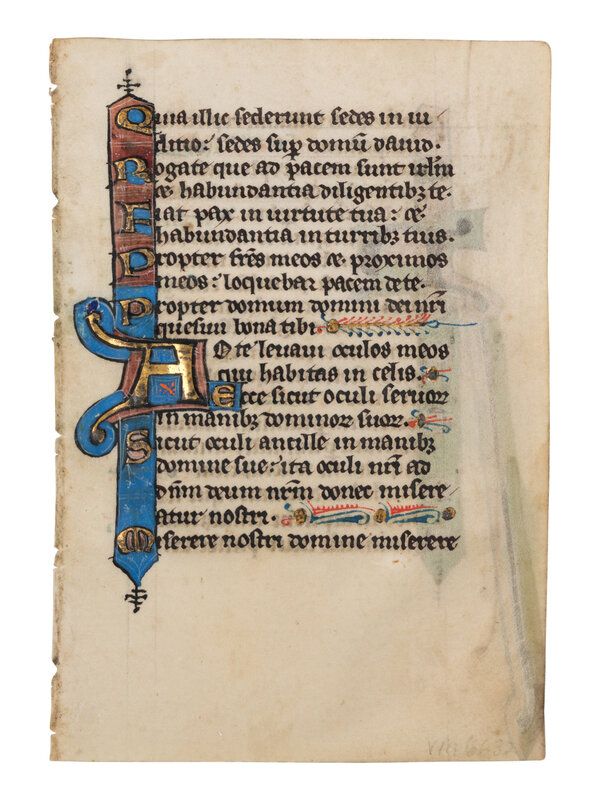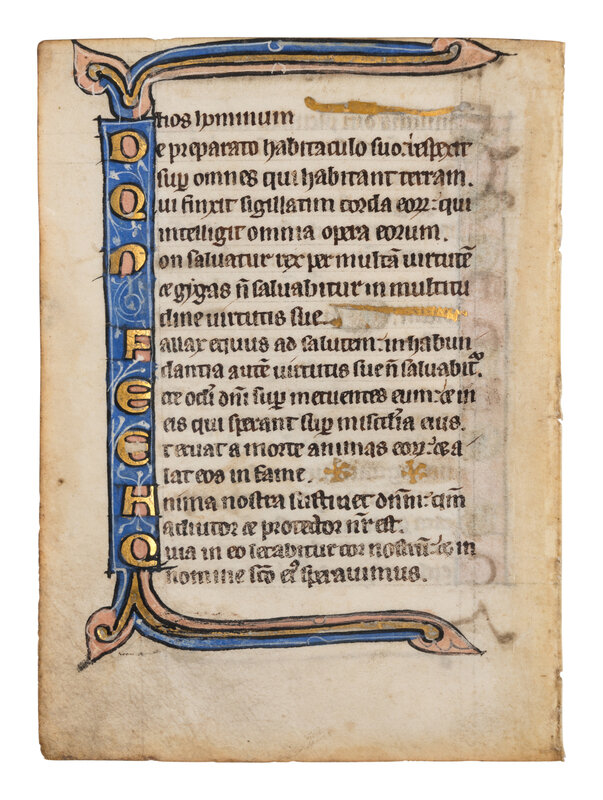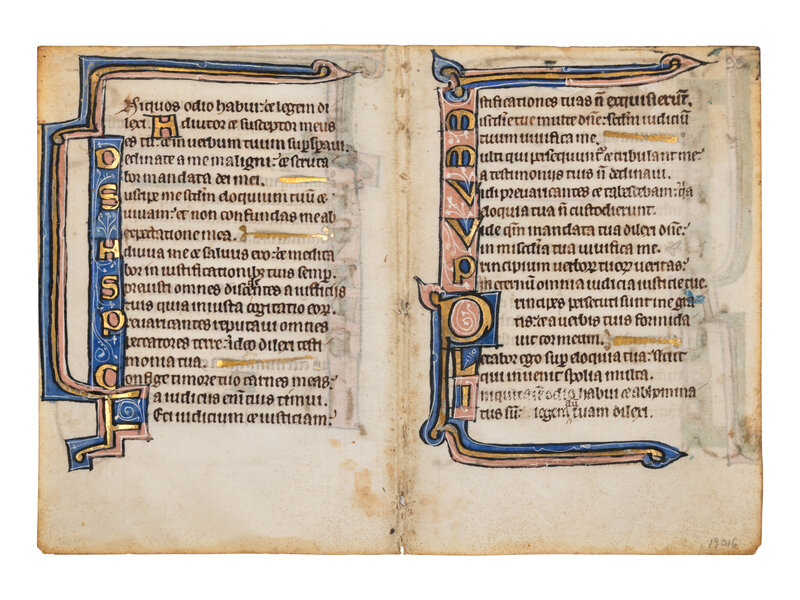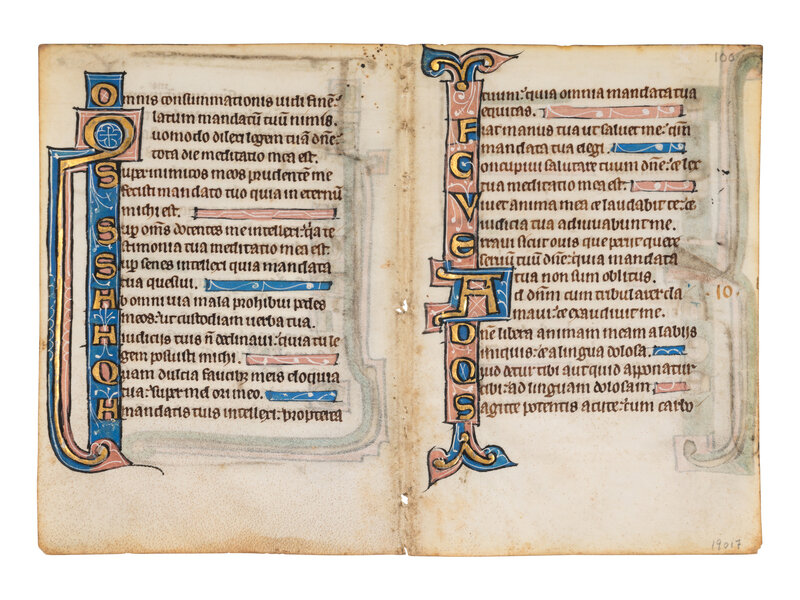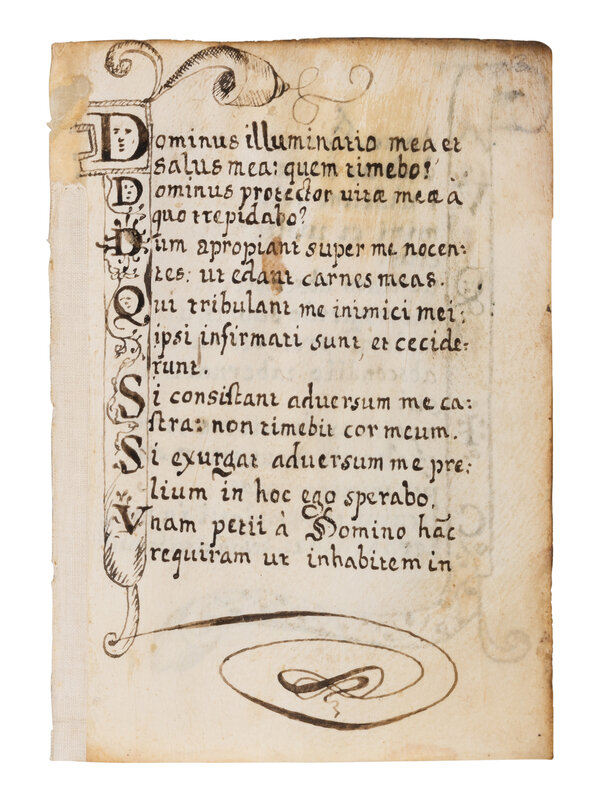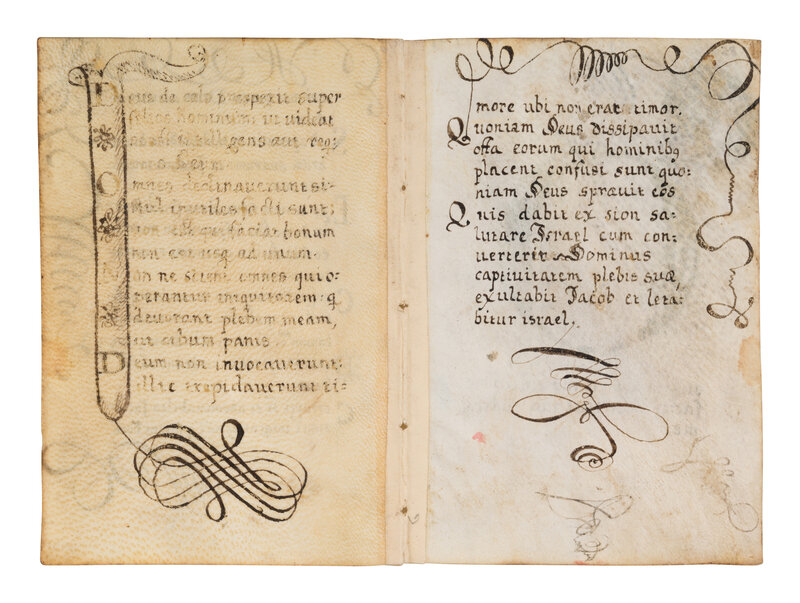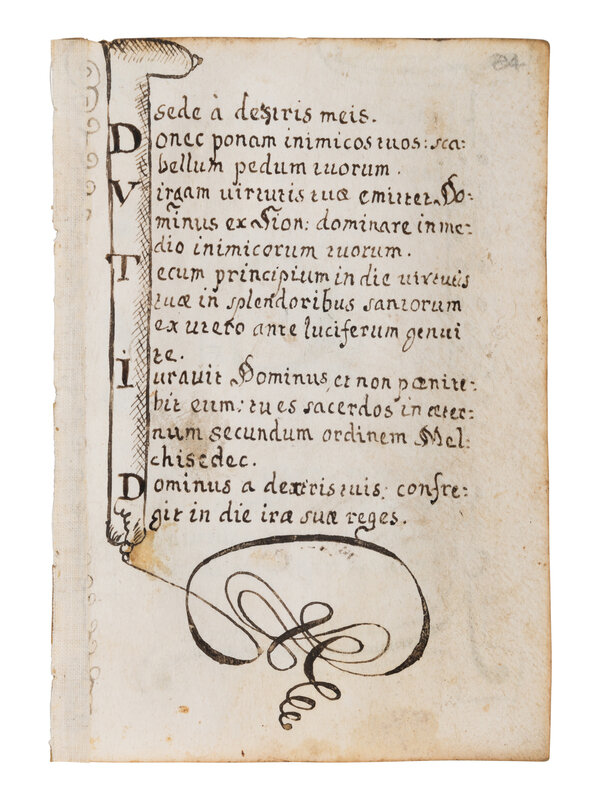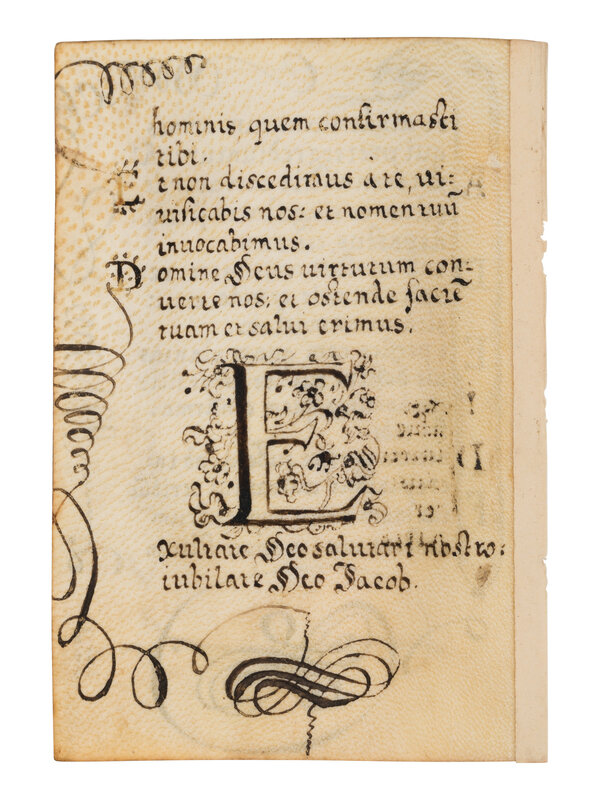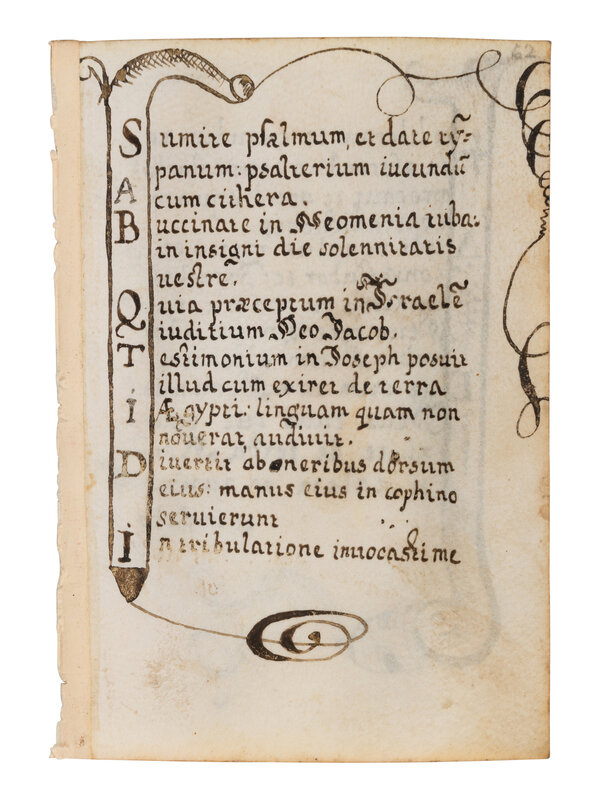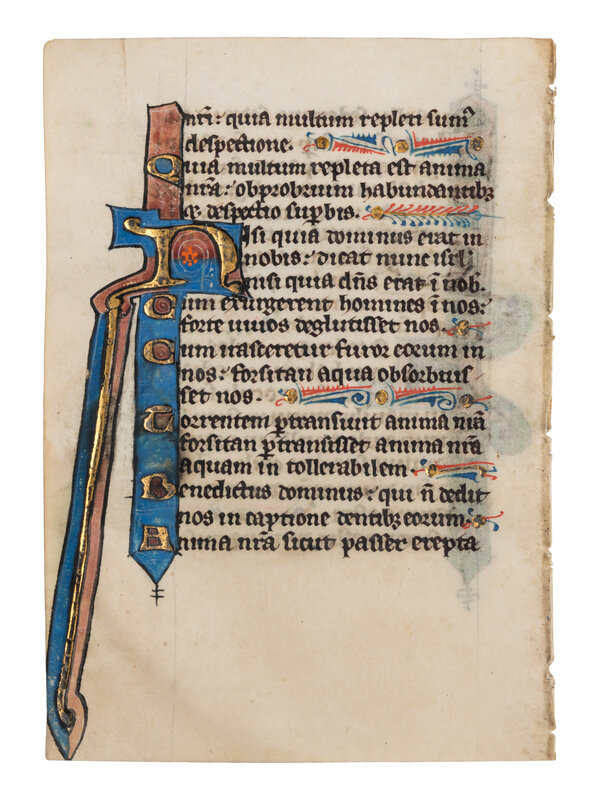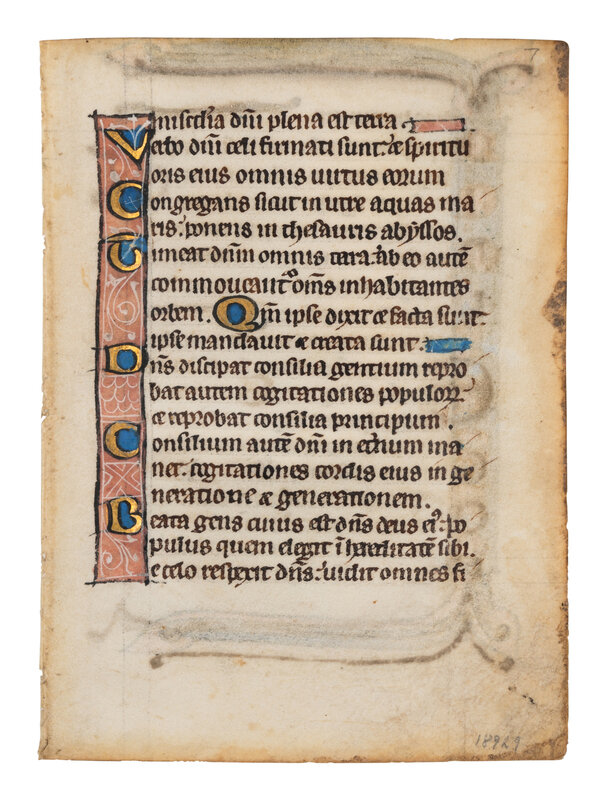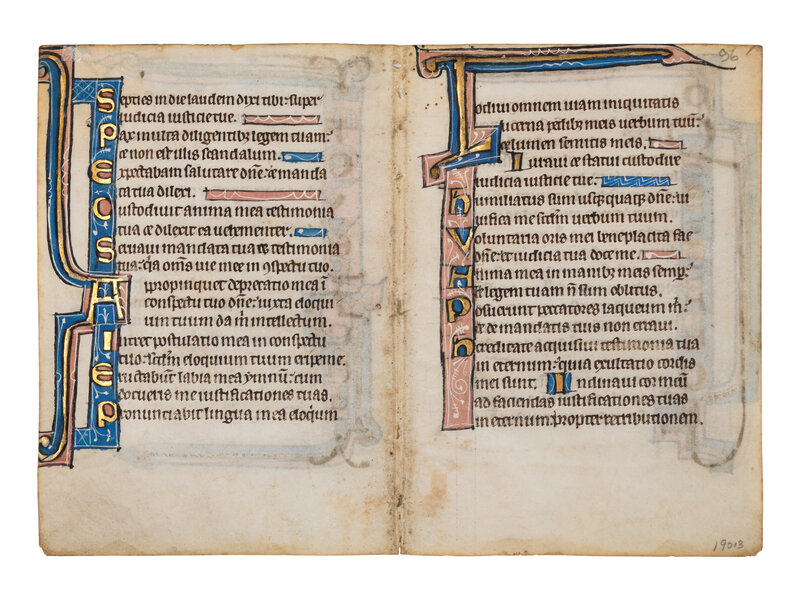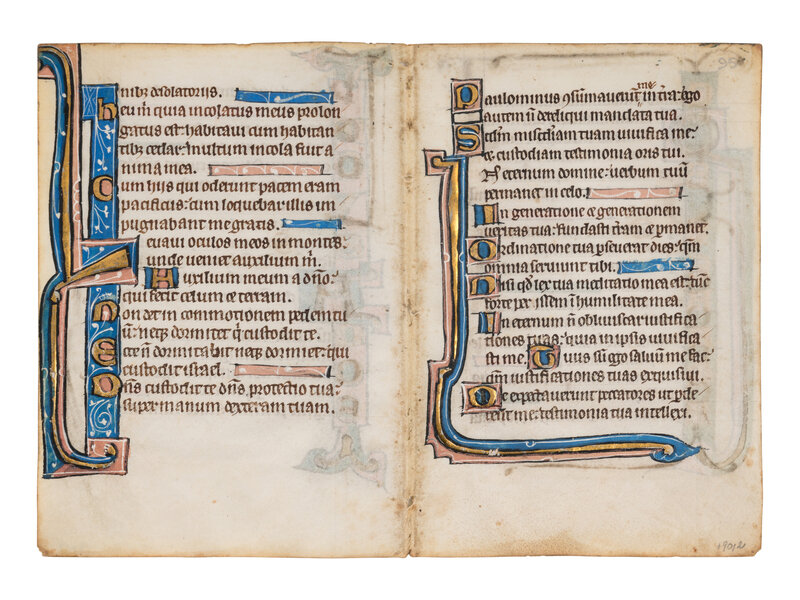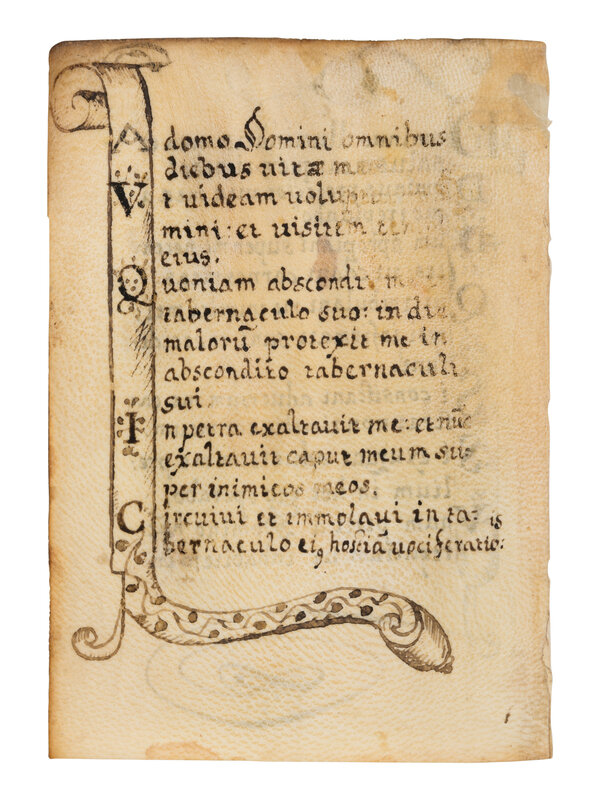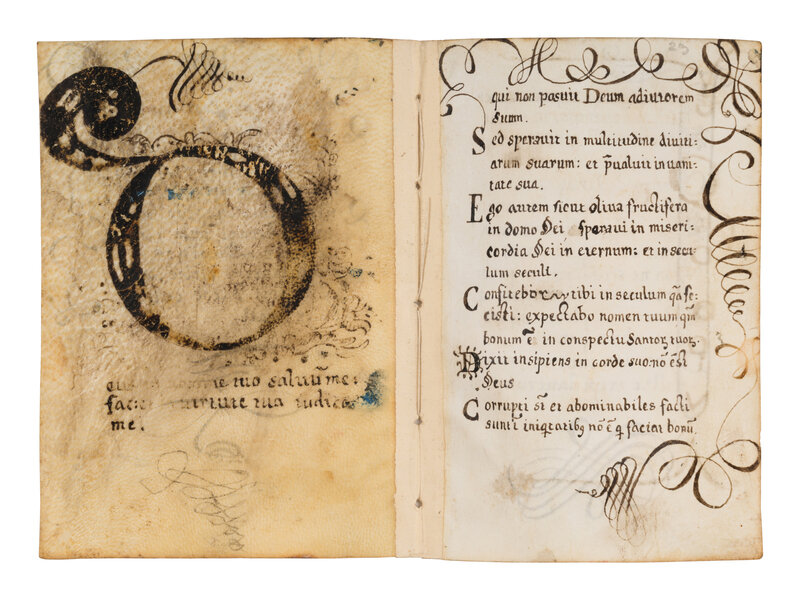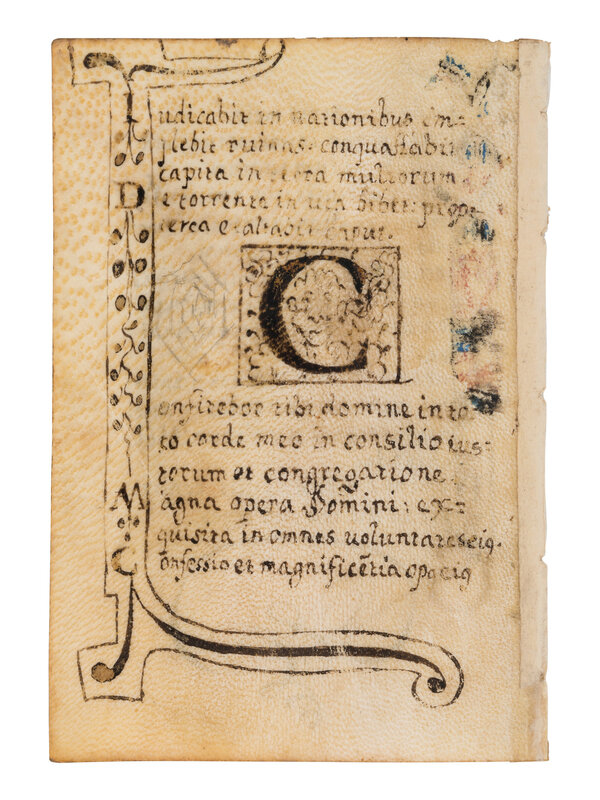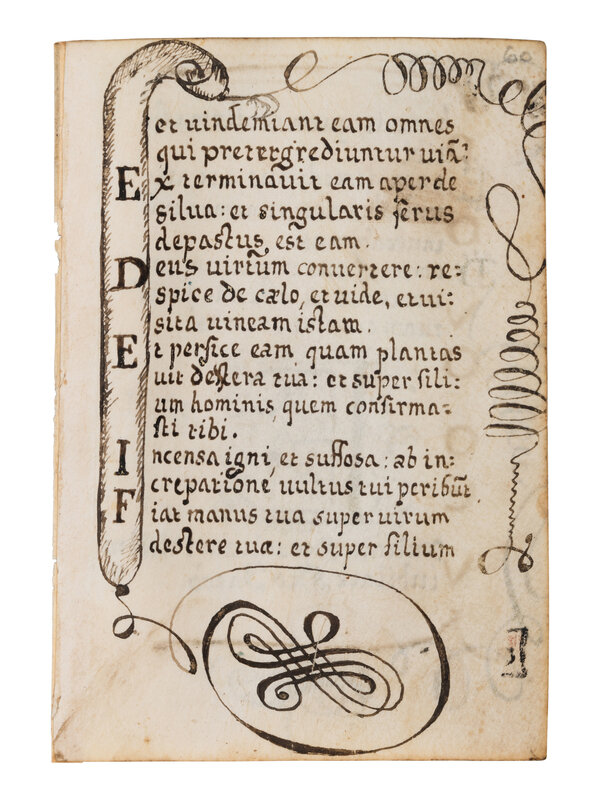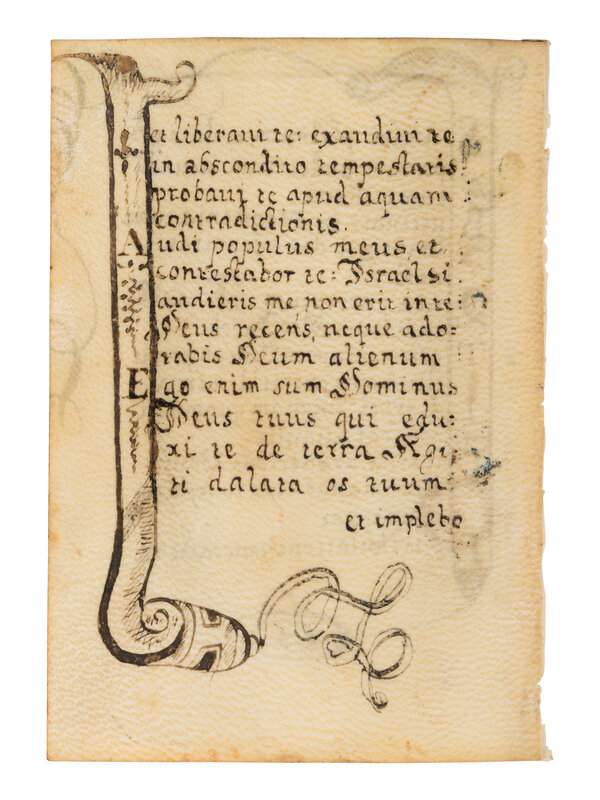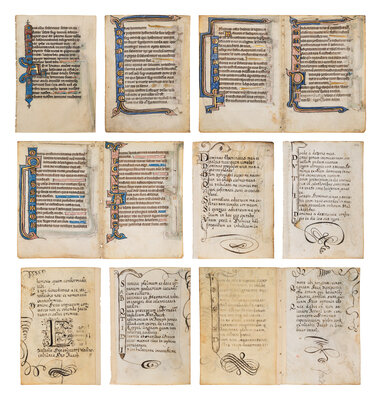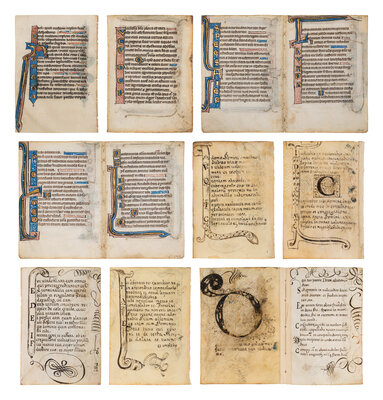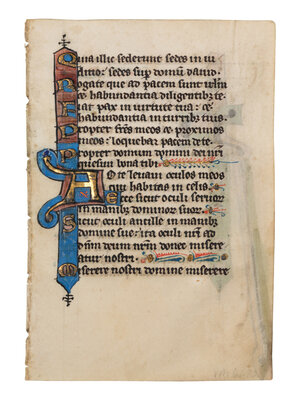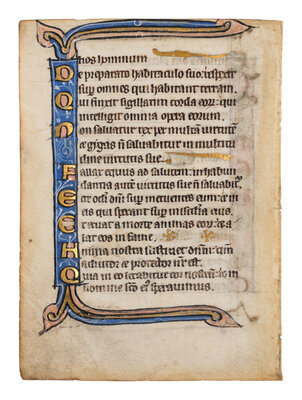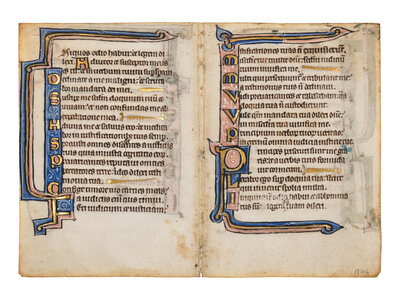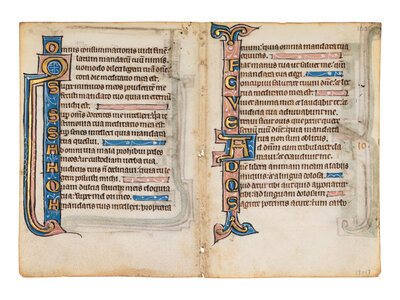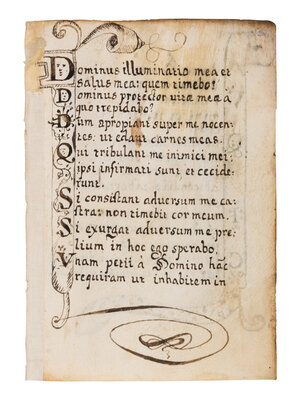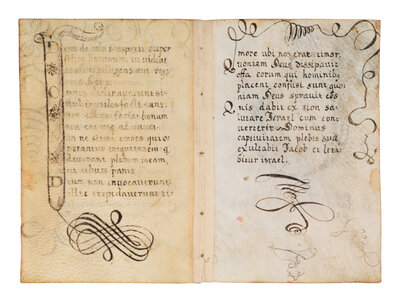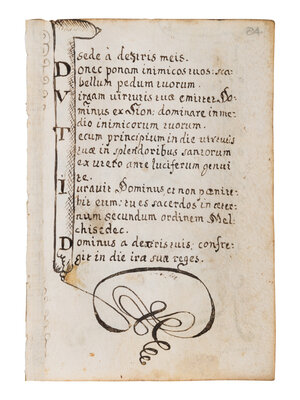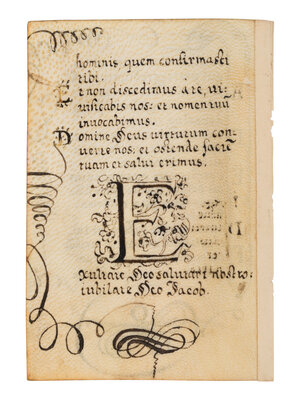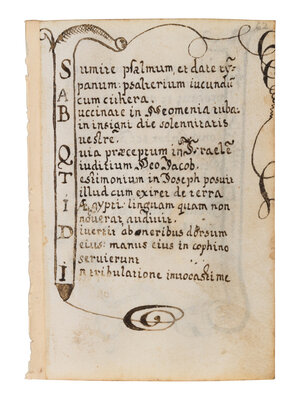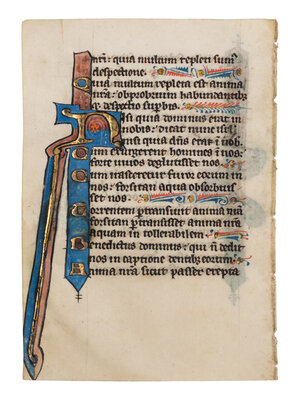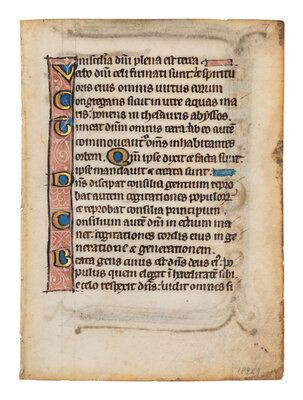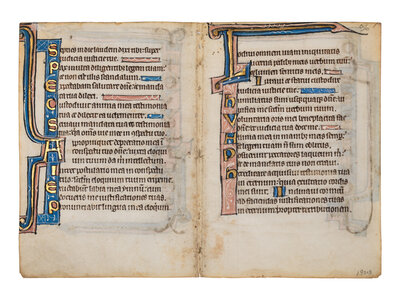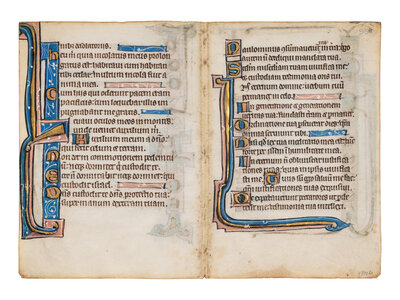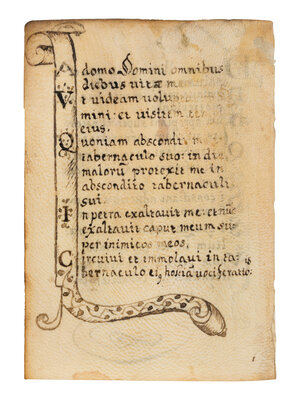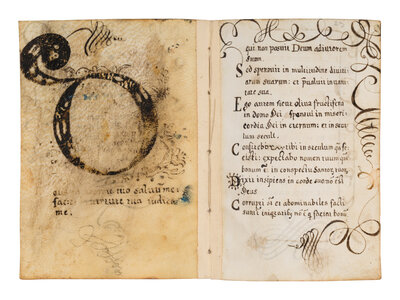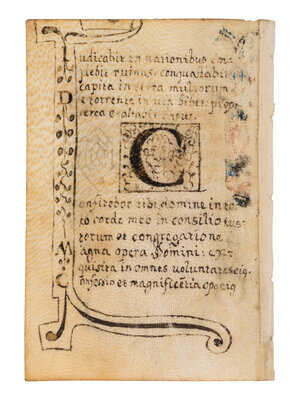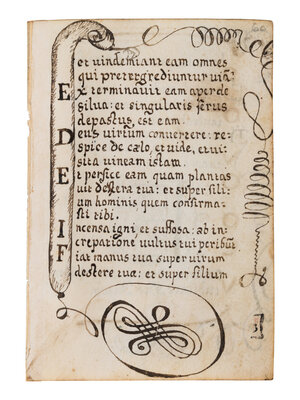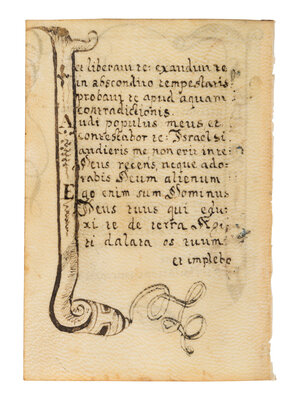Condition Report
Contact Information
Lot 33
A collection of leaves from Psalter manuscripts, illuminated in Flanders in the first half of the thirteenth century, joined with a group of seventeenth- or eighteenth-century Psalter leaves drawn according to similar models
Sale 2033 - Western Manuscripts and Miniatures
Jun 27, 2024
10:00AM CT
Live / Chicago
Own a similar item?
Estimate
$2,000 -
2,500
Price Realized
$2,540
Sold prices are inclusive of Buyer’s Premium
Lot Description
A collection of leaves from Psalter manuscripts, illuminated in Flanders in the first half of the thirteenth century, joined with a group of seventeenth- or eighteenth-century Psalter leaves drawn according to similar models
An ensemble of intriguingly illuminated leaves and bifolia from two Psalters.
(i) A leaf from a Psalter, in Latin, illuminated manuscript on parchment [Flanders (Belgium), c. 1210-1240]
128 x 87 mm. Single leaf, ruled in plummet for one column of 20 lines (written space: 80 x 53 mm), written in black ink in a small gothic textualis, line-fillers in red and blue with gold disks, one-lines initials in burnished gold on alternately blue and burgundy ground, TWO THREE-LINE ILLUMINATED INITIALS in burnished gold, framed with black on burgundy and blue ground, in-filled with white tracery and orange flowers, joined altogether in a ONE-SIDED BAR BORDERS on alternately burgundy and blue ground, framed with black and terminated with a black cross at each end (damp stain on the verso not affecting the legibility of text, but not the legibility of text, slight worn, else in good condition).
This leaf comes from a pocket-sized Psalter with unusual decoration typical of Flemish or Northern France manuscripts illuminated in the second quarter of the thirteenth century. The recto contains the end of Psalm 121 (beginning imperfectly with 121:3: “nostri, quia multum…”), and the beginning of Psalm 122, “Ad te levavi oculos meos…” (To thee have I lifted up my eyes, who dwellest in heaven). Psalm 122 is continued on the verso and followed with the beginning of Psalm 123, “Nisi quia dominus…” (finishing on Psalm 123:7: “…domine miserere”).
Provenance
Private collection, California, USA, MS 137.
Sister leaves
Sister leaves are, for example, at the University of Reading (England), MS 5650/39, with part of Psalm 88. Further sister leaves have been sold from the years 2000 onwards by Andrew Stewart (Catalogue 57, Manuscript Leaves & Early Printed Leaves, 2000, no. 1), Maggs Bros (Catalogue 1288, no. 74), Phillip J. Pirages (Catalogue 70, lot 152, with Psalm 118), and Charles Edwin Puckett (IM-12723, with Psalms 2-3; IM-4261, with Psalms 91-93). Another leaf formerly in the collection of the Ken and Elizabeth Teasdale Family, was last sold at Link Auction Galleries, St. Louis, MO, on 22 April 2023, lot 28.
LITERATURE
Further reading, see Kerstin Carlvant, Manuscript Painting in Thirteenth-Century Flanders. Bruges, Ghent, and the Circle of the Counts, Turnhout, 2013.
(ii) Two bifolia and one leaf from a Psalter, in Latin, illuminated manuscript on parchment [Flanders (Belgium), c. 1210-1240].
125 x 90 mm (each folio). Two bifolia and a single leaf, ruled in plummet for one column of 18 lines (written space: 80 x 55 mm), modern foliation in pencil ‘7’, ‘95’, ‘96’, ‘99’, and ‘100’ in the upper right corner, written in brown ink in a gothic rotunda, one-line versal initials in burnished gold on alternately pink and blue ground, line-fillers in gold, or alternately in blue and pink with white tracery, SIX THREE-LINE ILLUMINATED INITIALS in burnished gold on alternately blue and pink ground with white tracery, extending into the margins, joined altogether in ONE-SIDED BAR BORDERS on each page, framed with black (some smudges, browning on the edges, a few minor stains, else in good condition).
This group of leaves, whose rich and refined decoration is closely related to that of the previous lot, comes from another pocket-sized Psalter. It is readily recognized by the number of lines and the foliation of the leaves. The single leaf, foliated ‘7’, reads from Psalms 32:6 (beginning “misericordia domini plena est terra…”) to Psalms 32:19 (ending “…et in nomine sancto ejus speravimus”). The two bifolia were once part of the same quire of at least four foliated from f. 94 to f. 101, as the second and third bifolia. The first bifolium associates ff. 95 and 100, the second ff. 96 and 99. These read from Psalm 118:87 (beginning “Paulominus consummaverunt…”) to Psalm 118:121 (“Feci iudicium et justitiam…”), and from Psalm 118:155 (“[ju]stificationes tuas non exquisierunt…”) to Psalm 120:5 (ending “…super manum dexteram tuam”).
Provenance
Private collection, California, USA, MSS 239-241.
Sister leaves: At least two sister leaves to this set of bifolia and leaf are to be mentioned. The first, foliated ‘85’, containing Psalms 122-123, belongs to the Jim Sims Collection as Sims Leaf 16B. Another, which whereabouts are unknown, is foliated 101 and contains Psalms 120:6 to 122:4: it would thus have preceded one of the present bifolium. That leaf was lent, described, and illustrated in the Sacred Leaves, Liturgy & Devotion exhibition catalogue in 2005 (Tampa Library of the University of South Florida), as cat. 11.
LITERATURE
Further reading, see Kerstin Carlvant, Manuscript Painting in Thirteenth-Century Flanders. Bruges, Ghent, and the Circle of the Counts, Turnhout, 2013.
(iii) A bifolium and four leaves from a Psalter [France (?), 17th-18th century]
140 x 85 mm (each folio). One bifolium and four leaves, modern foliation in pencil “3,” “28,” “29,” “60,” “62,” and “84” in the upper right corner, ruled in plummet for one column of 16 lines (written space: 75 x 52 mm), written in a modern hand in brown ink, one- and two-lines initials drawn in brown and extending into the margins, penwork on most borders, joined altogether in a ONE-SIDED BAR BORDER on most pages, TWO LARGE INITIALS drawn in brown ink, in-filled with flowers, ONE FULL-PAGE DECORATED INITIAL drawn in brown ink (some dampstains, parchment worn, else in good condition).
This group of leaves is evidently inspired from thirteenth-century Psalters comparable to the two previous lots, considering the typical shape of the bar borders including versal initials. These leaves must have been produced in the seventeenth or eighteenth century in order to replace the missing leaves of a thirteenth-century Psalter. They are foliated as f. 3, 28-29, 60, 62, and 84, and read, respectively, Psalms 26:1-6, Psalms 51:9 to 53:3 (according to the Nova Vulgata), Psalms 79:13 to 80:2, Psalms 80:3 to 80:11, and Psalms 109:1 to 110:3.
Provenance
Private collection, California, USA, MS 360.
Freeman’s | Hindman thank Senior Consultant Sandra Hindman and Elliott Adam for their assistance in preparing this sale.
Property of a Private California Collector
